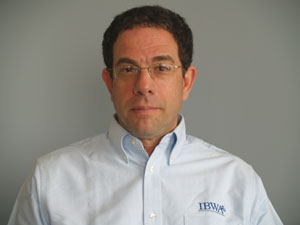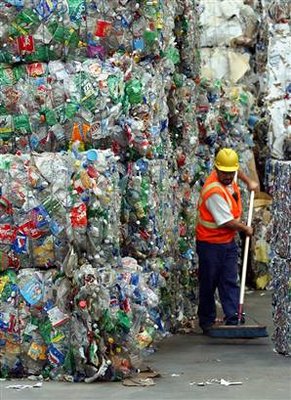Submitted by Anne Landman on
 Old tobacco industry PR flacks don't go away, they just defend different products for money. So it is with former Tobacco Institute spokesman Thomas Lauria, who is now defending bottled water.
Old tobacco industry PR flacks don't go away, they just defend different products for money. So it is with former Tobacco Institute spokesman Thomas Lauria, who is now defending bottled water.
Seems benign enough. After all, fighting for water -- albeit in an over-commercialized, overpriced and polluting form -- instead of cigarettes would seem to be an improvement for Lauria. But just as he battled efforts to educate people about the health hazards of secondhand smoke, Lauria is now battling efforts to educate people about the hoax that is bottled water.
The Bad in the Bottle
Bottled water means big money for beverage manufacturers, but people are starting to realize that it's also big drain on their wallets and the environment. Bottled water costs a whopping 2,000 times more than tap water, and about 40 percent of mass-produced bottled water brands come from the same sources as tap water. Tap water is also subjected to more regulations than bottled water. Moreover, bottled water also siphons money from taxpayers' pockets. Last March, Corporate Accountability International surveyed the budgets of five states and found that taxpayers in those states were shelling out between $78,000 and $450,000 for bottled water, a resource that essentially flows free from public taps. People are discovering this information to the detriment of the bottled water companies, which made $11 billion on the product in 2008.
The Fiji Water debacle of 2009 was even more of a PR disaster for the bottled water industry. After the Fiji Water company ran an ad campaign promoting its bottled water by denigrating Cleveland, Ohio's tap water, the city of Cleveland decided to test its public water against a bottle of Fiji water. The results revealed that Fiji water contained 6.31 micrograms of arsenic per liter, while Cleveland's tap water had zero. This information prompted the cities of Los Angeles, San Francisco, Salt Lake City and Santa Barbara to ask their employees not to use bottle water and ban city spending on bottled water, and Chicago added a five cent tax per bottle.
 All of these factors, plus the environmental fiasco posed by the manufacture and disposal of billions of used plastic water bottles, are coming home to roost. It's also causing bottled water to fall out of favor.
All of these factors, plus the environmental fiasco posed by the manufacture and disposal of billions of used plastic water bottles, are coming home to roost. It's also causing bottled water to fall out of favor.
But Back to Lauria...
When he worked for the tobacco industry, Tom Lauria used to deny smoking was addictive. He denied the connection between secondhand smoke and respiratory disease. He also denied the health affects of parental smoking on children, opposed restrictions on cigarette vending machines and told us that efforts to end smoking in public places would lead to Prohibition. Now Lauria works for the International Bottled Water Association, which occupies the same address as the American Beverage Association, the soft drink companies' lobbying group. Lauria is running a campaign to try to convince people that bottled water is indisposable.
True to his old chops, the campaign is a re-run of many of the tobacco industry's PR tactics of yore. It tries to scare people by claiming that "anti-bottled water activists" are working to take away people's right to buy bottled water. Just like the Tobacco Institute claimed the EPA was disseminating false and misleading information when it concluded that secondhand smoke is a human carcinogen, Lauria claims the "anti-bottled water movement" is "busy disseminating false and misleading information about bottled water." Lauria's new campaign also leverages the "health concerned segment" of the market by claiming bottled water is better for people with heart disease, diabetes and obesity (as though the same health benefits can't be achieved by drinking tap water). In his desperation to reverse downward sales trends for bottled water, Lauria has even posted a remarkably lame, low-budget video on YouTube featuring a cute teenage girl urging people to fighting for bottled water.
What About That Free Marketplace?
In response to public education campaigns, people are finally seeing the down side to bottled water and are speaking with their wallets. That's the whole idea behind a free marketplace, but the same corporations that lobby for an unfettered market can't seem to accept it when people make a free decision to stop buying their products. A downward sales chart no longer means "re-think your product." Instead, it means "deploy a new PR campaign."
Like cigarettes, maybe bottled water will continue to fall out of favor. If it does, more people will save more money, billions of plastic bottles will stay out of landfills, a huge amount of energy and petroleum will be saved on the manufacture of single-use plastic bottles and people remain well-hydrated by public water supplies. That all sounds great.
But it will also mean that, once again, PR whiz Tom Lauria will be out on the streets, looking for another losing product to defend.

Comments
Tom Lauria replied on Permalink
corrections
Peter Gleick replied on Permalink
Bottled water issues
Anonymous replied on Permalink
cigarettes = water
Anne Landman replied on Permalink
Use a non-disposable, refillable bottle...
Amber replied on Permalink
Hi Thanks for the amazing
Anonymous replied on Permalink
bio link
Anne Landman replied on Permalink
Thanks
merville cratte replied on Permalink
bottled water
truth about abs scam replied on Permalink
Inelasticity of bottled water
Anonymous replied on Permalink
bottled water vs tap...
Pages